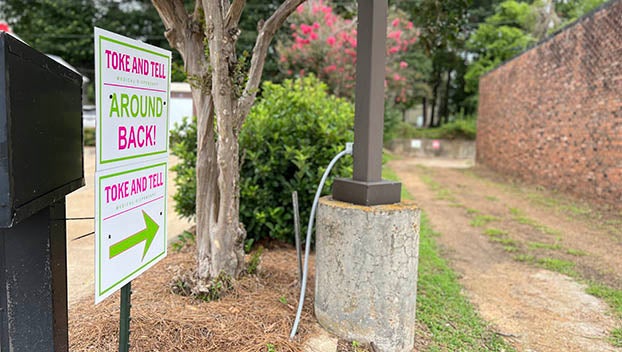Sheriff: Cemetery work not OK
Published 12:15 am Friday, June 24, 2011

ERIC SHELTON | THE NATCHEZ DEMOCRAT An unkept tombstone rests in the Watkins Street Cemetery Thursday afternoon in Natchez.
NATCHEZ — Adams County Sheriff Chuck Mayfield said he was eager when he became sheriff to get his office to help clean up the historic Watkins Street Cemetery, but he has since learned that legally, his office can’t do that.
State legislation was recently passed allowing county inmates to maintain historic cemeteries, but Mayfield said his inmates cannot clean up the perpetually overgrown Watkins Street cemetery because it is inside Natchez city limits.
Adams County Board of Supervisors Board Attorney Bobby Cox said at the request of the board, he asked the Mississippi Attorney General for an opinion on the issue, to which he received a “no.”
“We can work on historic cemeteries within borders of the county over which the board has jurisdiction,” Cox said.
While the sheriff’s office can answer crime calls in the city limits, Cox said the cemetery property is outside of its jurisdiction for upkeep, according to the statute.
Thelma White, who started the non-profit group Worthy Women of Watkins Street Cemetery Association, said at a May 16 board meeting many black Natchezians are buried in the cemetery of questionable private ownership because they were once not allowed to be buried at the city cemetery.
Ser Seshs Ab Heter-CM Boxley spoke at the meeting about the need for long-term solutions.
“What needs to happen now is upkeep and maintenance,” he said.
Deputies have volunteered to clean the cemetery before, Mayfield said, but they cannot sustain the maintenance.
Mayfield said inmates can perform labor anywhere on public property in the county — including inside city limits — as long as the labor benefits government in some way, such as public building maintenance or trash pick up. Inmates cannot work on private property, however.
Mayfield said the inmates who work most often are trustee inmates who volunteer to work and pass an interview.
Depending on the charge for which the inmate was arrested and the interview, approximately six to eight trustees are available for labor Monday through Friday, and sometimes Saturday, Mayfield said.
“Overall we’ve had great success with them,” Mayfield said. “They’re mostly ready to work.”
In addition, inmates have the option to pay off a fine by earning minimum wage toward what they owe doing inmate labor.
Mayfield said the Mississippi Department of Transportation usually reimburses the sheriff’s office for wages of inmate supervisors — usually retired law enforcement — when inmates pick up trash on the highways.
However, since one of the two vehicles used for trash pickup stopped working in April, inmates have picked up trash less frequently and a deputy has had to supervise the work.
Mayfield said trash pickup will happen more frequently when MDOT provides his office with another van.
“But their strapped too,” he said of financial constraints.
On most weekdays, Mayfield said two or three inmates usually work inside and five inmates generally work outside.





